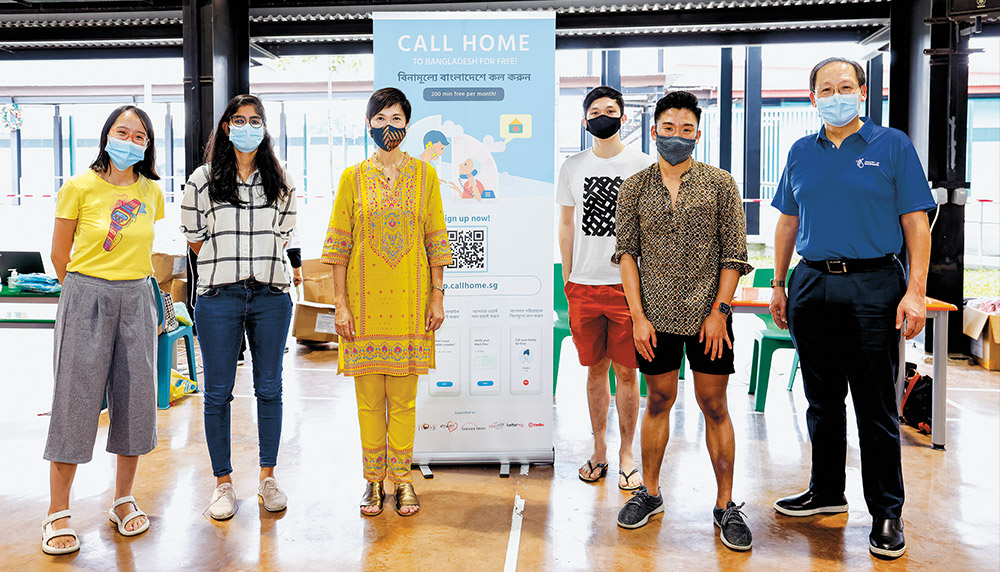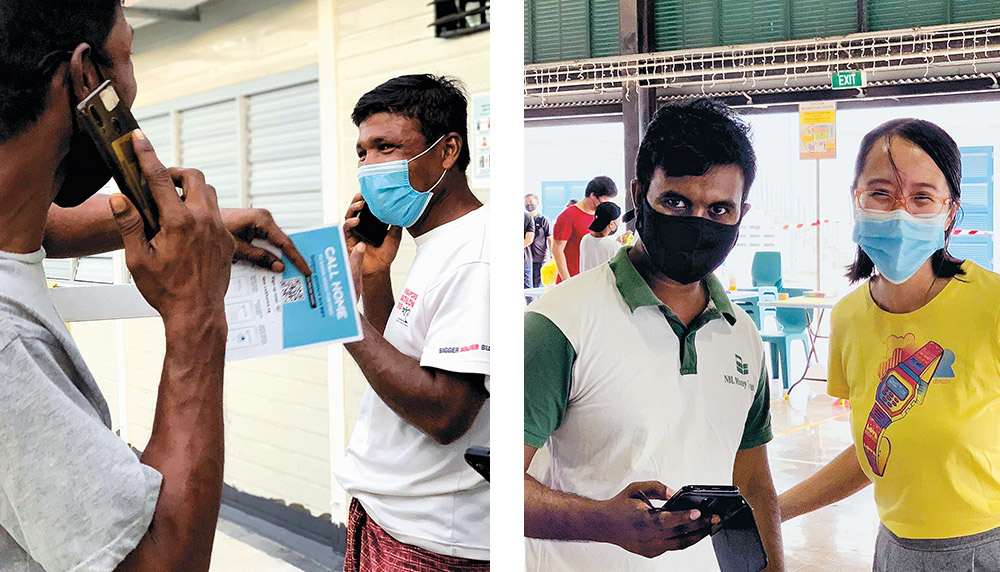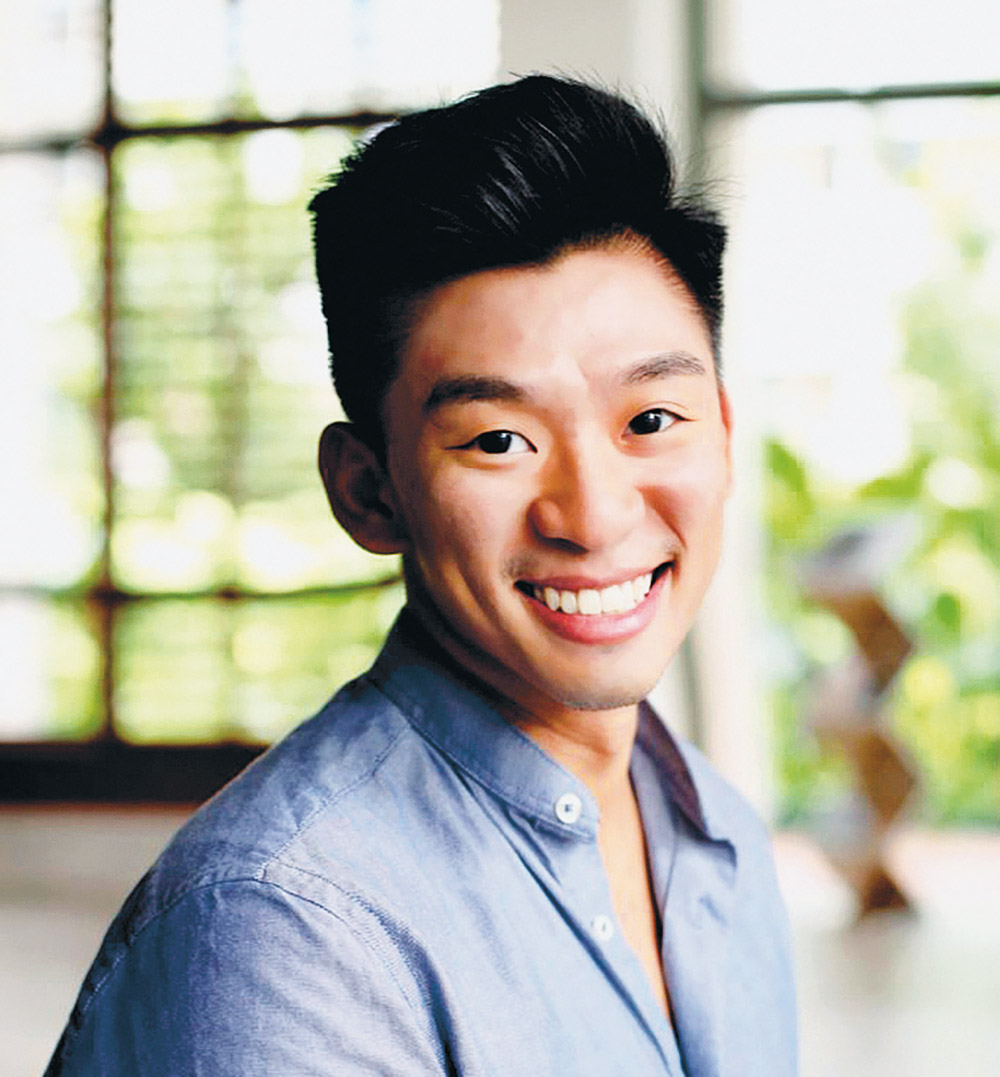The Comfort of a Call Home
How empathy drove Mr David Chia (Yale-NUS ’17) to find a solution for a problem he had never experienced himself.
 The Call Home team with former Minister for Manpower, Ms Josephine Teo (Arts and Social Sciences ’90) (in yellow) and current Minister for Manpower, Dr Tan See Leng (Medicine ’89).
The Call Home team with former Minister for Manpower, Ms Josephine Teo (Arts and Social Sciences ’90) (in yellow) and current Minister for Manpower, Dr Tan See Leng (Medicine ’89).
WHO SHE IS
Mr David Chia is part of the team that developed Call Home, an award-winning tech solution that helps migrant workers stay connected with their loved ones. The Yale-NUS graduate serves on the ‘Alumni Giving Committee’ and is currently based in Ireland.
For many of us, voice and video calls with friends and family have been a lifeline through the COVID-19 pandemic. But for Singapore’s migrant workers, it is a luxury that they sometimes cannot afford. The problem is made worse by the low internet penetration in rural Bangladesh, where many of these workers’ families are based. “They can’t call their loved ones through web-based services like WhatsApp,” explains Mr David Chia, a product manager with Facebook. “Instead, they rely on calls via prepaid IDD cards.”
 A member of the Call Home team with a user of the service.
A member of the Call Home team with a user of the service.
Accessing these cards during last year’s Circuit Breaker was a challenge as the workers’ movements were restricted. When they could get their hands on the cards, they would end up paying about a tenth of their monthly salary just to hear the voices of their loved ones. “The comfort of a loved one’s voice was especially important as case numbers in the dormitories kept going up and people were living in fear,” shares Mr Chia. He continues, “It’s a comfort that a lot of us take for granted.” He admits that he was no different in this respect. “I’m from Malaysia so I spent 2020 away from my family, who are still there. In some ways, I took it for granted that my family would know how to pick up my WhatsApp call or join a Zoom link. But there was a sense of empathy that drove me to act. What if we couldn’t reach them? How would we feel?”
ADAPTING AN IDEA
Thankfully, Mr Chia did not have to devise a solution from scratch. Realising that they could help alleviate the migrant workers’ challenges, he and three friends decided to adapt a tech solution they had developed during a hackathon earlier that year to the present situation. This initial solution had targeted another demographic often underserved by tech: Singapore’s large community of seniors. But the group of four quickly pivoted their idea — and along came Call Home. Powered by cloud communications platform Twilio, the app allows 3G-to-landline calls. This means that workers can use the internet to call landlines back home. “To make a call, they go to a website on their phone and log in with a Facebook or Google ID. Then they can upload contacts and hit ‘dial’ to talk to their families,” says Mr Chia. An hour-long conversation on Call Home takes up just 1.5MB of data.
![]()
This experience has put me in touch with other people around my age who are as passionate in bringing about change as I am.
To tailor their solution to the needs of migrant workers, the Call Home team embarked on a series of consultations with these workers. These were made possible with the support of organisations like JTC, the COVID-19 Migrant Support Coalition and Transient Workers Count Too. These consultations eventually resulted in a two-month pilot programme for about 60 workers.
 Mr David Chia.
Mr David Chia.
KEEPING IT SUSTAINABLE
Despite the enthusiastic response, the team faced some challenges. For one, Twilio is not a free platform: each call has a fixed cost. Mr Chia and his team have tapped on their personal networks of friends and contacts to help build a sustainable funding model for Call Home so that the costs passed on to the migrant workers are minimal. Twilio.org, the social impact arm of Twilio, supports the initiative by offering a heavily-discounted rate for its services, bringing down the costs of calls by more than half.
The remaining amount is covered through partnerships with corporates and voluntary welfare organisations. For instance, a partnership with Facebook pays for all the calls made by workers constructing the tech giant’s data centres in Singapore. The Call Home team has also started a fund-raising campaign on GIVE.asia, which hopes to raise $100,000 for their service. This sum will allow 10,000 workers to access Call Home for free throughout the year. Given the large sums of money they were raising, they valued accountability. “Better.sg, which is a non-profit volunteer-run organisation that promotes tech-for-good, approached us and offered to adopt us, which we readily agreed to,” he recalls.
 SUCCESS CALLING
SUCCESS CALLING
> Call Home has caught the eye of the
Singapore Business Review, which conferred the
Mobile Award for Telecommunications on the service.
> It was praised by Deputy Prime Minister Heng Swee Keat at the Smart Nation & U conference in March.
> More than
1,000 users use Call Home every month.
DISCOVERING COMMUNITIES
Though he is no longer heavily involved in the day-to-day running of Call Home, Mr Chia still gives the occasional input. The experience, he says, has been an enriching one. “At Yale-NUS, I was exposed to many people who had ideas about making a difference. Yet your priorities change when you start working,” he reflects. “But this experience has put me in touch with other people around my age who are as passionate in bringing about change as I am.”
It is not just the do-good community that Mr Chia has been exposed to. He has also learnt a lot about the migrant workers who have toiled thanklessly to build today’s Singapore. Recalling one of the most memorable moments of the project, he says, “One of my teammates was going to meet some of the workers for the first time and she told me that she was a little nervous. At that point, I wore my ‘anthropology major’ hat and told her to blend in and they would welcome her more than she thought they would. And they did just that! At the end of the session, she told me, ‘I can’t believe how welcoming they were. They did not see me as ‘the other’; they just offered me food and received me with open arms’.”
Click
here to donate to the Call Home fundraiser.